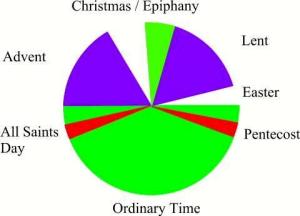 So here we are in Ordinary Time, the longest liturgical season that will stretch until the Sunday after Thanksgiving when Advent begins. I noted in my Trinity Sunday essay a couple of days ago that for several reasons this has never been my favorite stretch of the liturgical calendar. But I recall someone in the Living Stones discussion group saying last year at this time that in a post-Covid19 world, “ordinary” seems more attractive than usual.
So here we are in Ordinary Time, the longest liturgical season that will stretch until the Sunday after Thanksgiving when Advent begins. I noted in my Trinity Sunday essay a couple of days ago that for several reasons this has never been my favorite stretch of the liturgical calendar. But I recall someone in the Living Stones discussion group saying last year at this time that in a post-Covid19 world, “ordinary” seems more attractive than usual.
A few years ago, I led a seminar during the morning of the first day of an Honors faculty two-day workshop with twenty colleagues. The text was a handful of essays from Michel de Montaigne, who regular readers of this blog know is one of my favorite philosophers. Toward the end of a fine discussion we focused our attention to one of Montaigne’s many memorable reflections, this one from the next to last page of the Essais.
The most beautiful of lives to my liking are those which conform to the common measure, human and ordinate, without miracles, though, and without rapture.
My colleagues were not unanimous in their reaction to Montaigne’s sentiment, but when are academics ever unanimous concerning anything, even the Pope’s Catholicism? A few suggested that this seemed to be both a recipe for mediocrity and a denial of the importance of miracles and ecstasy. A colleague from my philosophy department said “Socrates would not have agreed with any of this,” and I overheard a colleague from English close by opining under his breath that Emily Dickinson would not have approved either. They are probably right, although I suspect that Montaigne did not have Socrates’ past or Emily’s future approval at the top of his list of concerns as he wrote.
Other colleagues found much to like in this passage. A professor from the history department, who had just finished the final year of an outstanding teaching and scholarly career on the way toward professor emeritus status, said “I find this inspiring. It says that a beautiful life is not to be judged by whether you get your name on a plaque in City Hall.” This from a man who has a seminar room in our beautiful humanities center named after him in honor of his extraordinary contributions over several decades to thousands of students and hundreds of colleagues.
I agree that this passage from Montaigne is inspirational. He is not suggesting that mountain-top experiences are unimportant; rather, he is reminding us that a beautiful life is not constructed from such experiences. There is a reason why the majority of the Christian liturgical year, although seasoned with the miracle of the Incarnation and the rapture of Easter, is spent in long stretches of inwardness, waiting, and getting down to the day-to-day, week-to-week work of being a regular human being trying to live a life in the presence of the Divine. As the old saying says, life is what happens while we are making other plans. Montaigne suggests that the beauty of a life is to be judged by what you are doing between the miracles and the ecstasy. Or as Jeanne has suggested, it’s about the “dash”—the little line that will carved between the two dates on your tombstone.
Some time ago, Jeanne and I had brunch with two couples after church, a lovely occasion that we all agreed should happen more frequently. All six of us had been to a few rodeos—I was the youngest person at the table. My friend Marsue’s birthday had occurred a week or so earlier, so we all sang happy birthday as the waiter brought her a small dessert. The waiter remarked on Jeanne’s beautiful singing voice, a nice connection was made, and good vibes were in abundance. Jeanne and I tend to be generous with tips when the service is good; this time, Jeanne was so generous when bill-paying time came that the waiter returned with the cash, wondering if Jeanne had made a mistake.
She assured him that she hadn’t; we then learned he would be headed for LA in a month to pursue a career in entertainment promotion. Grabbing his hands, Jeanne offered a quick, heartfelt and spontaneous prayer asking for the Divine’s blessing on this young man’s endeavors. “I’ll remember you,” he said to Jeanne as he headed back to the kitchen. And I’m sure he will—it was a lovely moment of grace in the midst of an ordinary Sunday afternoon.
I have written previously about my love for the closing paragraph of George Eliot’s Middlemarch. It not only is the most perfect paragraph I have read in any of the hundreds of novels that have filled my reading life, but it is also a perfect expression of the sort of life Montaigne considers to be beautiful. Of her heroine Dorothea Brooke, Eliot writes:
Her finely touched spirit had still its fine issues, though they were not widely visible. Her full nature, like that river of which Cyrus broke the strength, spent itself in channels which had no great name on the earth. But the effect of her being on those around her was incalculably diffusive: for the growing good of the world is partly dependent on unhistoric acts; and that things are not so ill with you and me as they might have been, is half owing to the number who lived faithfully a hidden life, and rest in unvisited tombs.
I find this description of a life beautifully lived in “ordinary time” helpful in these early days of sabbatical. I would love to write a bestseller. I would love mine to be the first likeness carved on the Mount Rushmore for Teachers that someone should create sometime. I would love to have thousands of people all over the world waiting with rapt attention for my next wise and witty blog post. But I would like most to faithfully live a life according to Montaigne’s “common measure,” bringing what I have to offer into each new day with intelligence, energy, and an occasional infusion of divine humor. Miracles and rapture are fine if you get them, but at the end of the road a “nicely done” would be even better.













